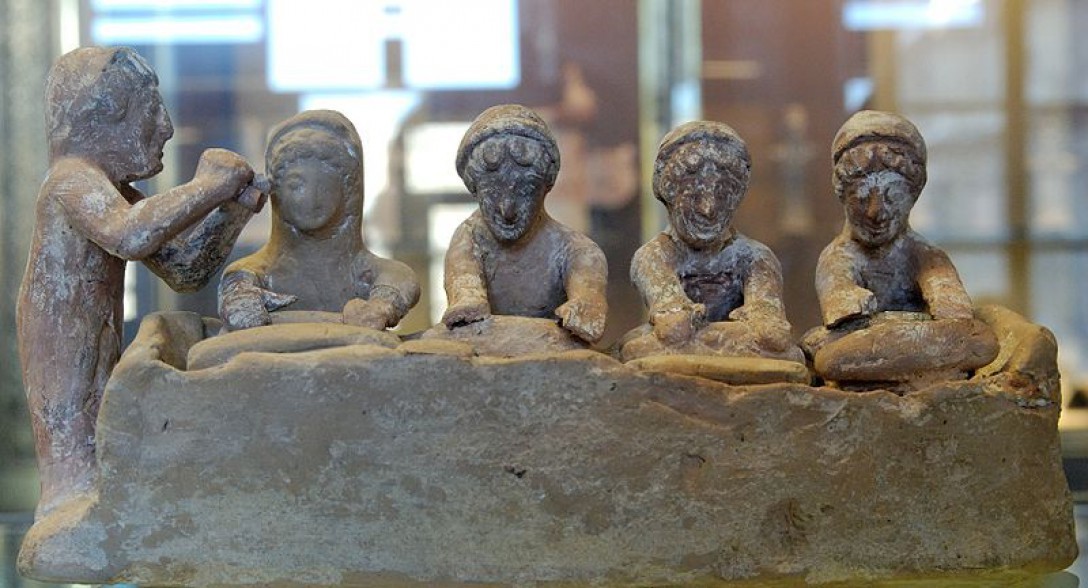Τhe climax (ladder) of Divine ascent. Monks climb and fail from the ladder to heaven. They have to overcome 23 vices and gluttony is among them.
(John of the Ladder or John Scholasticus or John Sinaites, 6th century)
Christian Church used fasting as a form of self – discipline, contempt for the flesh and sexual desire, mortification of sin, a way to the spiritual perfection. Since lust and gluttony were seen as deadly sins inextricably linked, the daily diet of the proper Christian’s should not arouse pleasure but only quench hunger and give strength for work. This connection between food, body, sins and spiritual life is one of the characteristics of the Christian theology. That’s why fast became central both to the monastic lifestyle and to life of common people.
However, the strict dietary rules imposed by the church dipped the life of poor of Byzantium and most habitants of Ottoman occupied Greece in misery. Considering that the official fast days count the 2/3 of the year, the perpetual undernourishment of the poor became worse and worse. If the fortunate could brighten the fasting diet with fresh and pickled oysters, fresh, dried or pickled octopus, black caviar, egg-roe, taramas, fresh and dried fruits etc., the poor suffered. Not only they did not have enough money to soften the Fast’s rigors they did not even dare to break the fast. Neither old men, nor sick men, nor even children were excepted from the strict and steady diet. On 1806, the anonymous writer of Greek Nomarchy asked the Patriarch to limit the days of feasts and fasts, because the feasts prevented the profit and the fasts damaged the health. But only one patriarch, Jeremiah, had dared to suggest less fasting days, on 1705. Unfortunately his effort had no result; he had been almost lynched by the infuriated grocers and fishermen, because they had seen their profits being in danger.
The truth is that the term fast could be quite elastic. It could cover not only abstinence, but also a variety of foods, prepared with skill and expense for the fortunate ones. It is also true that the use of delicious ingredients was not allowed by the Eastern Church. On contrary, Church approved the lack of cooking talent as means to sharpen the fast. The only consolation allowed to Byzantine monks was the begging of the kneeled cooks for forgiveness for their incompetence. However, in the wealthy monasteries of 12th century- that is the period of ethical crisis of orthodox monasticism- the rich monks enjoyed inspired and luxurious alternatives that diverted attention from the absence of meat. Even at the years of Turkish occupation of Greece, some monasteries could serve abundant delicacies to their guests. On 1797, roast piglet, lamb, pigeons, hens, olives, honey, pomegranates, almonds, grapes, white and red wines, were offered to Claude Savary by the Bishop of St. George, a Cretan monastery; he also enjoyed forty dishes full of meats, legumes and fruits at the Cretan monastery of Asomaton.
Dembinska M, ‘Fasting and working monks, regulations of the fifth and eleventh centuries’ in Fenton A, Food in change (1986)
Russell N, The lives of the Desert Fathers, (1981)
Simopoulos K., Foreign Travelers, p.427-8 (1984), Greek ed.



#Joumana, under Ottoman occupation, church used fasting to impose its position as the main source of morality and ethics.
#”Thou shall not kill thy neighbor”? Don’t forget that major religious traditions (and churches) have so often srpead the violence and hate instead than understanding and respect for the other.
Always enjoy getting some background information with your posts; it is amazing to me how despite poor folks extreme suffering from all this fasting patriarchs would not budge! As always, they are the victims of all this nonsense. I am all for self-discipline, but how about directed at important things like ” thou shall not kill thy neighbor”?
Is is OK to wage wars as long as we fast? It does not matter, people will not change, history has proven it time and again!
Thank you for your kind words Tiffany. You have a great blog… I love read it.
Mariana
Wow, what an interesting history! I’ve been fasting for Lent since I was little and never really understood much about what it meant to fast – other than just not eating. Thanks for getting me re interested in the subject!
I found your blog through the leftover queen’s forum and look forward to reading more.
Cheers,
Tif